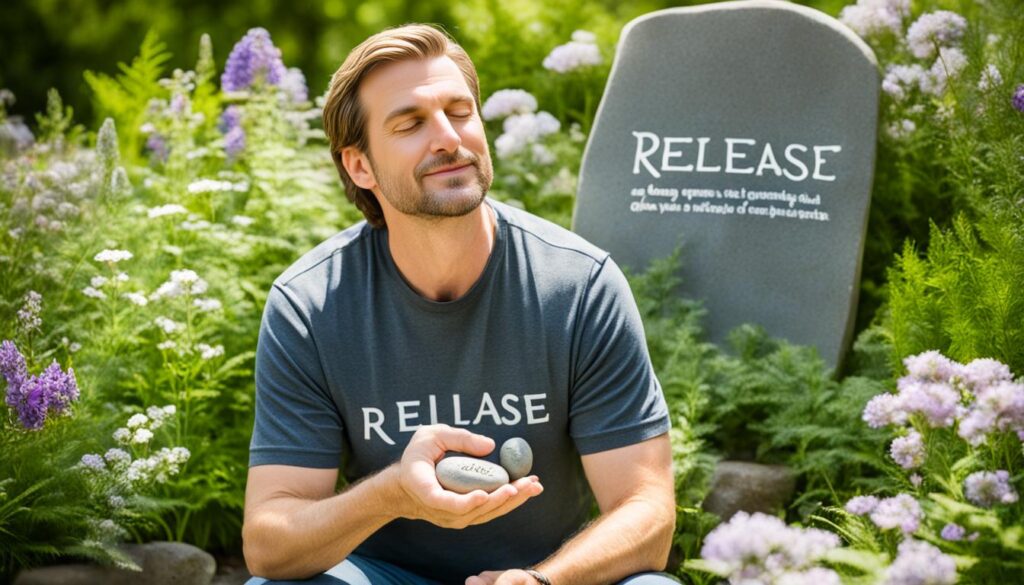Relationships are the cornerstone of human connection and love. They bring joy, companionship, and support into our lives. However, they can also be a source of hurt and pain. When hurt feelings arise in a relationship, it can feel like the foundation is crumbling, leaving us lost and unsure of how to heal.
In Buddhism, there is a profound quote that reminds us of the power we have within ourselves to overcome any hurtful experience:
“Pain is inevitable, suffering is optional.”
This quote reminds us that while pain may be a natural part of life, it is our response to that pain that determines whether we suffer. When it comes to relationships, we have the power to choose how we navigate and heal from hurt feelings.
Whether you are dealing with emotional pain after a breakup, struggling to heal from relationship hurt, or looking for ways to overcome hurt in your current relationship, this article will provide you with valuable insights and actionable strategies. Learn how to heal and move forward, rebuilding trust and embracing a love-filled future.
Key Takeaways:
- Healing hurt feelings in relationships is a process that takes time, understanding, and effort.
- Open and honest communication is essential for addressing the causes of hurt and finding healing.
- Seeking professional help can provide additional support and guidance in the healing process.
- Implementing coping strategies and focusing on self-care are important for emotional healing.
- Rebuilding trust is possible with patience, communication, and vulnerability.
What are hurt feelings in a relationship?
In a relationship, hurt feelings are emotional responses that occur when actions, words, or behaviors negatively impact your well-being or sense of security. These feelings can arise from a lack of trust, respect, love, or value in the relationship. They can also stem from a lack of emotional support, understanding, or effective communication.
Hurt feelings have a negative impact on your overall well-being. They can damage your self-esteem, erode trust, and leave you feeling emotionally drained. These emotional responses can create tension and distance between you and your partner, ultimately straining the relationship.
To overcome hurt feelings, it is important to prioritize open communication and empathy. By fostering an environment of trust and respect, you can create space for healing and address the underlying issues causing these emotions.
Empathy plays a critical role in understanding and validating each other’s emotions. It allows you to put yourself in your partner’s shoes, gaining a deeper understanding of their perspective and experiences. By practicing empathy, you can demonstrate support and compassion, which can help rebuild the emotional connection in your relationship.
Open communication is key in resolving hurt feelings. It involves expressing your emotions honestly and respectfully, while also actively listening to your partner’s perspective. Through open and transparent conversations, you can address the issues that have caused the hurt and work towards finding resolutions together.
By addressing hurt feelings in a relationship with open communication and empathy, you can start the healing process. Rebuilding trust, fostering respect, and nurturing emotional well-being are essential steps towards creating a stronger and healthier relationship.

Common causes of hurt feelings in a relationship
In a relationship, hurt feelings can stem from various causes, leading to emotional distress and damage to the bond between partners. Understanding these common causes is crucial in addressing and resolving the underlying issues. The following factors often contribute to hurt feelings:
- Lack of Effective Communication: Insufficient or ineffective communication can result in misunderstandings and misinterpretation of intentions, ultimately causing hurt feelings.
- Misunderstandings: Failure to clarify or misunderstandings about each other’s words, actions, or expectations can lead to hurt feelings.
- Unresolved Conflicts: Lingering conflicts that remain unresolved can create emotional distress, breed resentment, and amplify hurt feelings over time.
- Breached Boundaries: Disregarding or disrespecting personal boundaries can deeply wound a person’s sense of security and well-being.
- Infidelity: The breach of trust caused by infidelity can inflict profound emotional pain and damage the foundation of a relationship.
- Broken Promises: Failing to follow through on promises can erode trust, leaving partners hurt and disappointed.
- Lack of Emotional Support: Feeling neglected or unsupported emotionally can lead to feelings of hurt, loneliness, and disconnection.
Addressing these common causes of hurt feelings requires open and honest communication, empathy, and a willingness to work together to rebuild trust and strengthen the emotional bond between partners.
How to get over hurt feelings in a relationship: 13 ways
Dealing with hurt feelings in a relationship can be challenging, but it’s important to take proactive steps towards healing and moving forward. Here are thirteen effective strategies that can help you cope with relationship hurt and foster positive emotional changes:
- Allow yourself to grieve and express your emotions: It’s essential to give yourself permission to feel and process the pain. Allow yourself to grieve the loss of what could have been and express your emotions in a healthy way.
- Accept the pain and understand its source: Acknowledge the pain you’re feeling and try to understand where it is coming from. Recognizing the source can help you gain clarity and perspective.
- Communicate clearly with your partner: Open and honest communication is key to resolving conflict and healing from hurt feelings. Express your needs, concerns, and emotions to your partner in a calm and constructive manner.
- Make positive emotional changes: Focus on personal growth and self-improvement. Engage in activities that bring you joy and enhance your emotional well-being.
- Let go of the past: Holding onto past grievances can hinder your progress. Practice forgiveness and let go of resentment, allowing yourself to move forward without carrying the weight of past pain.
- Focus on the important things in your life: Shift your attention towards the positive aspects of your life, such as your career, hobbies, friendships, and personal goals. Cultivating fulfillment in other areas can help you find inner strength and resilience.
- Seek professional help if needed: If your hurt feelings persist or become overwhelming, don’t hesitate to seek support from a trained professional. Therapy can provide valuable guidance and tools for healing.
- Expressing emotions: Openly sharing your emotions can foster understanding and deeper connections with your partner. Allow yourself to be vulnerable and express how you feel.
- Accepting pain: It’s important to acknowledge and accept the pain you’re experiencing. By embracing your emotions, you can begin to process and heal from them.
- Letting go of the past: Dwelling on past hurts can hinder your ability to move forward. Let go of grudges and embrace the present moment.
- Communicating with your partner: Effective communication is essential for resolving conflicts and rebuilding trust. Engage in open, honest conversations with your partner to address the issues that led to hurt feelings.
- Focusing on the important things: Redirect your focus towards the aspects of your relationship that truly matter. Prioritize shared values, emotional connection, and mutual growth.
- Seeking professional help: If you’re struggling to overcome hurt feelings on your own, don’t hesitate to seek assistance from a qualified therapist. They can guide you through the healing process and provide valuable insights.

By implementing these strategies, you can take important steps towards healing from hurt feelings and fostering positive changes in your relationship. Remember to be patient with yourself and your partner, as healing takes time and effort. With commitment and a willingness to grow, you can create a stronger, more fulfilling relationship.
| Strategy | Description |
|---|---|
| Allow yourself to grieve and express your emotions | Give yourself permission to feel and process the pain, expressing your emotions in a healthy way. |
| Accept the pain and understand its source | Acknowledge the pain and gain clarity by understanding its source. |
| Communicate clearly with your partner | Openly and honestly communicate with your partner to resolve conflict and address hurt feelings. |
| Make positive emotional changes | Focus on personal growth and engage in activities that enhance emotional well-being. |
| Let go of the past | Practice forgiveness and release resentment to move forward without carrying the weight of past pain. |
| Focus on the important things in your life | Shift your attention towards fulfilling aspects of your life, such as your career, hobbies, and personal goals. |
| Seek professional help if needed | Don’t hesitate to seek support from a trained professional if your hurt feelings persist or become overwhelming. |
| Expressing emotions | Openly share your emotions with your partner to foster understanding and deeper connections. |
| Accepting pain | Acknowledge and accept the pain you’re experiencing as part of the healing process. |
| Letting go of the past | Release past hurts and grudges, focusing on the present moment. |
| Communicating with your partner | Engage in open, honest conversations to address the issues that contributed to hurt feelings. |
| Focusing on the important things | Prioritize shared values, emotional connection, and mutual growth in your relationship. |
| Seeking professional help | Consider seeking guidance from a qualified therapist to navigate the healing process. |
Falling in love and falling out of love
When it comes to matters of the heart, falling in love and falling out of love are two contrasting experiences that can greatly impact our lives. Understanding the components of these emotions and the process of rebuilding trust is essential for navigating the ups and downs of relationships.
Falling in love involves two main components: how the other person makes you feel about yourself and how you feel about them. It is a transformative journey of self-discovery, where you receive validation and reflection of your worth through the eyes of your partner. In this process, you experience a deepening emotional connection and a sense of belonging.

However, love can also come with its share of challenges. Betrayal and hurt can shatter the foundation of a relationship, causing a loss of trust and connection. When trust is broken, it can lead to falling out of love. The pain and sense of betrayal can create emotional distance, eroding the bond that once held the relationship together.
Rebuilding trust is essential in order to rekindle the flames of love and regain those feelings of connection and intimacy. It requires open communication, vulnerability, and a willingness to address the underlying issues that led to the hurt. Both partners must be committed to healing and growth, as rebuilding trust takes time and effort from both sides.
Reflecting on the Journey
As you navigate the complexities of love and relationships, take time to reflect on your own experiences. Consider the components of falling in love and the importance of validation and reflection in maintaining a healthy connection. Acknowledge the pain of falling out of love and the necessity of rebuilding trust to heal and move forward.
Components of Falling in Love and Falling Out of Love
| Components | Falling in Love | Falling Out of Love |
|---|---|---|
| Emotional Connection | Deepening emotional bond | Emotional distance |
| Validation | Feeling valued and appreciated | Feeling neglected or unimportant |
| Reflection | Seeing oneself through the eyes of the partner | Doubting the authenticity of the relationship |
| Trust | Building a foundation of trust | Trust being broken or betrayed |
By understanding the components of falling in love and falling out of love, you can navigate the complexities of relationships with greater insight and compassion. Remember that healing and rebuilding trust takes time, but with patience, open communication, and a commitment to growth, it is possible to create a love that withstands the tests of time.
Rebuilding trust and falling in love again
Rebuilding trust and falling in love again after experiencing hurt in a relationship requires patience, communication, and vulnerability. It is a challenging journey that demands both partners to actively engage in the healing process.
The person who caused the hurt must prove their change and demonstrate patience and understanding. This process involves consistent actions that show a sincere commitment to personal growth and positive transformation. It requires time and effort to rebuild broken trust and restore emotional security.
Observing growth is crucial in rebuilding trust. Both partners need to observe and acknowledge positive changes in behaviors and attitudes. By recognizing and celebrating progress, it becomes easier to heal and move forward together.
Respecting boundaries is another essential aspect of rebuilding trust. Establishing and honoring personal boundaries is a way to create a safe and secure environment within the relationship. When both partners understand and respect each other’s boundaries, it fosters trust and emotional well-being.
Opening up and having open communication play a pivotal role in rebuilding trust and reconnecting on a deeper level. Sharing vulnerabilities, fears, and desires allows for a renewed emotional connection. It creates an atmosphere of understanding and empathy, fostering a stronger bond between partners.
Seeking closure is an integral part of the healing process. It involves addressing unresolved issues and finding resolution for past hurts. Seeking closure allows individuals to let go of lingering pain and begin anew with a clean slate.
Developing healthy coping mechanisms is crucial in rebuilding trust and falling in love again. It involves finding constructive ways to manage emotions and navigate challenges. By adopting healthy coping strategies, such as practicing self-care, seeking support from loved ones, or engaging in therapy, individuals can heal and regain emotional stability.
Learning to trust again is a gradual process that involves patience and self-reflection. It requires individuals to challenge their fears and insecurities, allowing themselves to be vulnerable despite past hurts. With time, patience, and consistent effort, it is possible to rebuild trust and rediscover the joy of falling in love again.

Key Steps in Rebuilding Trust and Falling in Love Again:
- Prove change through consistent actions and personal growth.
- Observe growth and celebrate positive changes.
- Respect personal boundaries and create a safe environment.
- Open up and have open communication to foster emotional connection.
- Seek closure for unresolved issues and past hurts.
- Develop healthy coping mechanisms to manage emotions and challenges.
- Learn to trust again gradually through self-reflection and vulnerability.
Conclusion
Healing from hurt feelings in a relationship is a journey that requires sincere effort, patience, and understanding from both partners. It is essential to address and acknowledge the causes of hurt, fostering open and honest communication. Sometimes seeking professional help can provide valuable guidance.
By implementing effective coping strategies and allowing space for emotional healing, individuals can gradually move forward in their relationships. Rebuilding trust is a vital aspect of this process, which may involve proving change, respecting boundaries, and observing growth. It also necessitates opening up and being vulnerable, fostering renewed emotional connection.
Ultimately, the goal is to achieve emotional well-being and embrace a future filled with love and happiness. Although healing from hurt may take time, dedicating effort and understanding to the process can lead to a stronger and more fulfilling relationship. So, take the necessary steps, nurture your emotional well-being, and embark on a love-filled future with optimism and resilience.
FAQ
How can I get over hurt feelings in a relationship?
Healing from hurt feelings in a relationship takes time and effort. Some tips for getting over hurt feelings include expressing your emotions, accepting the pain, communicating with your partner, making positive changes, and focusing on yourself and your priorities.
What are hurt feelings in a relationship?
Hurt feelings in a relationship are emotional responses caused by actions, words, or behaviors that negatively impact one’s well-being or sense of security. They can stem from a lack of trust, respect, love, emotional support, understanding, or effective communication.
What are the common causes of hurt feelings in a relationship?
Common causes of hurt feelings in a relationship include lack of effective communication, unresolved conflicts, breached boundaries, infidelity, broken promises, and lack of emotional support.
How can I get over hurt feelings in a relationship?
To get over hurt feelings in a relationship, it is important to allow yourself to grieve and express your emotions, accept the pain and understand its source, communicate clearly and openly with your partner, make positive emotional changes, let go of the past, and seek professional help if needed.
What is the process of falling in love and falling out of love?
Falling in love involves feeling validated and reflected in oneself by the other person. Falling out of love occurs when there is a sense of betrayal and hurt in the relationship.
How can trust be rebuilt in order to fall in love again after being hurt in a relationship?
Rebuilding trust and falling in love again after being hurt in a relationship requires patience, communication, and vulnerability. It involves proving change, demonstrating patience and understanding, observing growth, respecting boundaries, opening up, having open communication, seeking closure, finding healthy coping mechanisms, and learning to trust again.
What is the conclusion regarding healing from hurt feelings in a relationship?
Healing from hurt feelings in a relationship is a process that takes time, understanding, and effort from both partners. By addressing the causes of hurt, communicating openly, seeking professional help if needed, and implementing coping strategies, individuals can move forward in their relationships and embrace a brighter, love-filled future.

